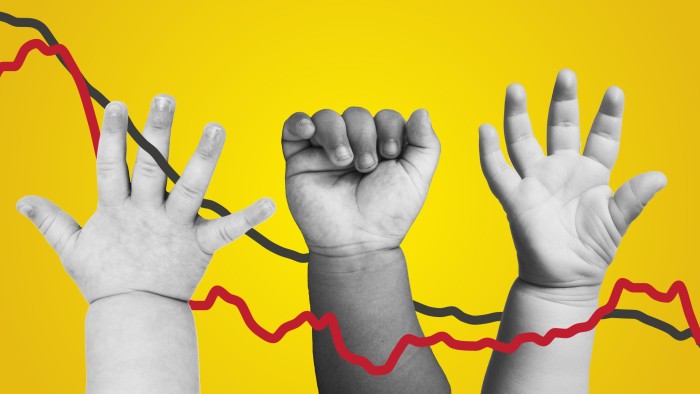Unlock the Editor’s Digest for free
Roula Khalaf, Editor of the FT, selects her favourite stories in this weekly newsletter.
Three more EU member states — including the most populous, Germany — have joined the list of countries with “ultra-low” fertility rates, highlighting the extent of the region’s demographic challenges.
Official statistics show Germany’s birth rate fell to 1.35 children per woman in 2023, below the UN’s “ultra-low” threshold of 1.4 — characterising a scenario where falling birth rates become tough to reverse.
Estonia and Austria also passed under the 1.4 threshold, joining the nine EU countries — including Spain, Greece and Italy — that in 2022 had fertility rates below 1.4 children per woman.
The fall in birth rates partially reflects the “postponement of parenthood until the 30s”, which involves a “higher likelihood that you will not have as many children as you would like because of the biological clock”, said Willem Adema, senior economist at the OECD.
Without immigration, low fertility rates mean a shrinking working-age population, adding pressures on public finances and limiting economic growth.
With young people reaching life milestones, such as buying a house, later in life, the average age of EU women at childbirth rose to 31.1 years in 2023, a year later than a decade ago. The figure rises is 31.4 in Germany, and over 32 years in Spain, Italy and Ireland.
Austria reported a fall to 1.32 children per woman in 2023, down from 1.41 in the previous year. In Estonia, the rate hit 1.31 in 2023, down from 1.41 in the previous year.
Birth rates have fallen across Europe — even in countries such as Finland, Sweden and France, where family-friendly policies and greater gender equality had previously helped boost the number of babies.
In Finland, the birth rate was above the EU average until 2010, but it dropped to 1.26 in 2023, the lowest since the record began in 1776, according to official data.
France had the highest birth rate at 1.79 children per woman in 2022, but the national figures showed it dropped to 1.67 last year, the lowest on record.
Rates fell lower also in countries where they were already ultra-low, reaching 1.12 in Spain and 1.2 in Italy in 2023.
Guangyu Zhang, population affairs officer at the UN, called for governments “to put more family-friendly and gender-responsive policy measures in place”, saying this would enable women and men to have the multiple children that surveys claim they want.
Experts believe economic and political upheaval partly explain the trend of people having fewer children.
“You might have a job, but if you’re worried about losing it, or worried about inflation or worried about conflict in Ukraine, then you still might hesitate to have children,” said Ann Berrington, professor of demography at the University of Southampton.
Changes in social attitudes might also be at play.
Adema said: “The norms of what it means to be a good parent and how intensive you should participate in that are such that quite a few young people say: ‘Well, in addition to the fact that I don’t need children to be happy, it would also be a very difficult job for me to do, and I’m not sure that I can take that responsibility’.”
Read the full article here




